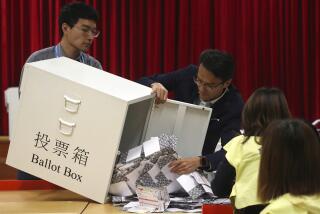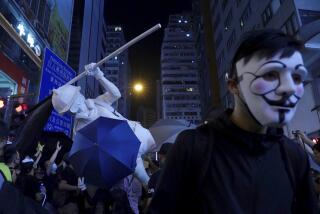Hong Kong Leader Eases Dispute With China on Reforms
- Share via
HONG KONG — A showdown between Britain and China over democratic electoral reforms here was averted--or at least delayed--as Gov. Chris Patten called Wednesday for continued negotiations before China assumes control of this British colony in 1997.
Patten, former chairman of the Conservative Party in Britain, enraged the Chinese government last October in his first policy speech as governor when he called for an increase in directly elected representatives on the Hong Kong Legislative Council.
Some supporters of democracy here hoped Patten would use his annual address before the council Wednesday to announce his intention to go ahead with the reforms without China’s approval.
But after a year in which he was the focus of venomous attacks by Chinese officials, who have described him as a “prostitute,” the Hong Kong governor avoided a direct confrontation.
He said he hopes for a settlement before November, when he plans to travel to London to brief British Prime Minister John Major on the status of the talks.
Privately, officials said talks were at a dead end after 12 rounds, with little hope for resolution.
In his address Wednesday, Patten confirmed published reports that British negotiators have offered the Chinese two major compromises, in one case cutting democratic representation at a district level by two-thirds.
But he said the British have received no offers in return.
“Alas, we have still not succeeded in convincing Chinese officials that Hong Kong’s extraordinarily modest aspirations for political development are legitimate,” Patten said in his address.
In 1990, Beijing said it would accept direct election of 20 of 60 members of the Legislative Council. The first direct elections were held in 1991 when 18 members were directly elected.
But Patten’s reforms called for the election of the majority of the council’s members in elections scheduled for 1995. Such a format would allow what Patten describes as a “through train,” in which elected members would have two years of their terms remaining when China takes over.
Some critics, however, accuse the British of using Patten to make a last-minute grandstand play to avoid the impression that they are abandoning Hong Kong. Even some supporters of democratic reform join in this view of the departing British.
“What Patten has offered is only a drop of democracy,” said Emily Lau, an outspoken elected member of the council who supports Hong Kong independence from China. “Whatever the British are doing is to save face. I don’t understand why it is that Patten has been lionized in the Western press as a champion of freedom and democracy.”
After ruling here for 150 years as nearly absolute colonial masters, the British want to leave in 1997 when their lease runs out; they hope to be seen as staunch advocates of electoral democracy and human rights. The Communist Chinese government, which hoped to inherit both the colony’s dynamic economy and its autocratic tradition, charges that the British have changed the rules of the turnover, as contained in agreements signed by the two governments for the 1997 change of sovereignty.
More to Read
Sign up for Essential California
The most important California stories and recommendations in your inbox every morning.
You may occasionally receive promotional content from the Los Angeles Times.













